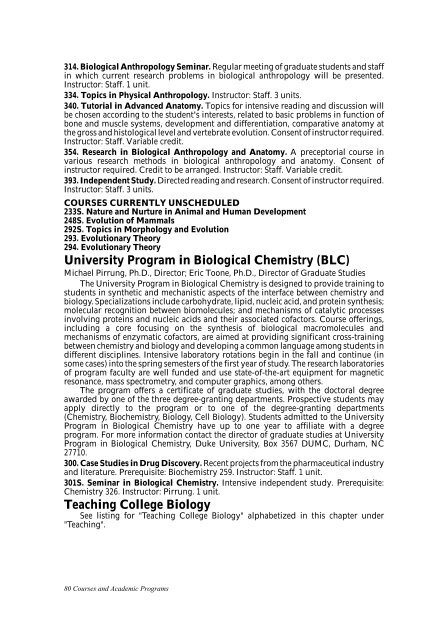Duke University 2003-2004 - Office of the Registrar - Duke University
Duke University 2003-2004 - Office of the Registrar - Duke University
Duke University 2003-2004 - Office of the Registrar - Duke University
You also want an ePaper? Increase the reach of your titles
YUMPU automatically turns print PDFs into web optimized ePapers that Google loves.
314. Biological Anthropology Seminar. Regular meeting <strong>of</strong> graduate students and staff<br />
in which current research problems in biological anthropology will be presented.<br />
Instructor: Staff. 1 unit.<br />
334. Topics in Physical Anthropology. Instructor: Staff. 3 units.<br />
340. Tutorial in Advanced Anatomy. Topics for intensive reading and discussion will<br />
be chosen according to <strong>the</strong> student's interests, related to basic problems in function <strong>of</strong><br />
bone and muscle systems, development and differentiation, comparative anatomy at<br />
<strong>the</strong> gross and histological level and vertebrate evolution. Consent <strong>of</strong> instructor required.<br />
Instructor: Staff. Variable credit.<br />
354. Research in Biological Anthropology and Anatomy. A preceptorial course in<br />
various research methods in biological anthropology and anatomy. Consent <strong>of</strong><br />
instructor required. Credit to be arranged. Instructor: Staff. Variable credit.<br />
393. Independent Study. Directed reading and research. Consent <strong>of</strong> instructor required.<br />
Instructor: Staff. 3 units.<br />
COURSES CURRENTLY UNSCHEDULED<br />
233S. Nature and Nurture in Animal and Human Development<br />
248S. Evolution <strong>of</strong> Mammals<br />
292S. Topics in Morphology and Evolution<br />
293. Evolutionary Theory<br />
294. Evolutionary Theory<br />
<strong>University</strong> Program in Biological Chemistry (BLC)<br />
Michael Pirrung, Ph.D., Director; Eric Toone, Ph.D., Director <strong>of</strong> Graduate Studies<br />
The <strong>University</strong> Program in Biological Chemistry is designed to provide training to<br />
students in syn<strong>the</strong>tic and mechanistic aspects <strong>of</strong> <strong>the</strong> interface between chemistry and<br />
biology. Specializations include carbohydrate, lipid, nucleic acid, and protein syn<strong>the</strong>sis;<br />
molecular recognition between biomolecules; and mechanisms <strong>of</strong> catalytic processes<br />
involving proteins and nucleic acids and <strong>the</strong>ir associated c<strong>of</strong>actors. Course <strong>of</strong>ferings,<br />
including a core focusing on <strong>the</strong> syn<strong>the</strong>sis <strong>of</strong> biological macromolecules and<br />
mechanisms <strong>of</strong> enzymatic c<strong>of</strong>actors, are aimed at providing significant cross-training<br />
between chemistry and biology and developing a common language among students in<br />
different disciplines. Intensive laboratory rotations begin in <strong>the</strong> fall and continue (in<br />
some cases) into <strong>the</strong> spring semesters <strong>of</strong> <strong>the</strong> first year <strong>of</strong> study. The research laboratories<br />
<strong>of</strong> program faculty are well funded and use state-<strong>of</strong>-<strong>the</strong>-art equipment for magnetic<br />
resonance, mass spectrometry, and computer graphics, among o<strong>the</strong>rs.<br />
The program <strong>of</strong>fers a certificate <strong>of</strong> graduate studies, with <strong>the</strong> doctoral degree<br />
awarded by one <strong>of</strong> <strong>the</strong> three degree-granting departments. Prospective students may<br />
apply directly to <strong>the</strong> program or to one <strong>of</strong> <strong>the</strong> degree-granting departments<br />
(Chemistry, Biochemistry, Biology, Cell Biology). Students admitted to <strong>the</strong> <strong>University</strong><br />
Program in Biological Chemistry have up to one year to affiliate with a degree<br />
program. For more information contact <strong>the</strong> director <strong>of</strong> graduate studies at <strong>University</strong><br />
Program in Biological Chemistry, <strong>Duke</strong> <strong>University</strong>, Box 3567 DUMC, Durham, NC<br />
27710.<br />
300. Case Studies in Drug Discovery. Recent projects from <strong>the</strong> pharmaceutical industry<br />
and literature. Prerequisite: Biochemistry 259. Instructor: Staff. 1 unit.<br />
301S. Seminar in Biological Chemistry. Intensive independent study. Prerequisite:<br />
Chemistry 326. Instructor: Pirrung. 1 unit.<br />
Teaching College Biology<br />
See listing for "Teaching College Biology" alphabetized in this chapter under<br />
"Teaching".<br />
80 Courses and Academic Programs









